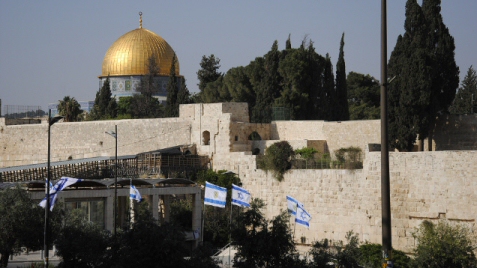A Jewish settler group, attempted to evict a house rented by a Palestinian family in the neighborhood of Aqabat al-Khalidiya in Jerusalem’s Old City, on Monday, citing that the house belongs to a Jewish family and that settlers have the right to inhabit it over of a Palestinian family.According to WAFA Palestinian News & Info Agency, the house’s owner, Ahmad Sub Laban, said his family rented the house in 1956 from Jordan’s then Custodian of Enemy Property (CEP), 11 years before Israel occupied the eastern part of Jerusalem. The house was originally owned by Jewish migrants before the CEP assumed control of Jewish-owned property upon the Israeli-Arab war in 1948.
The Jordanian Custodian of Enemy Property was established to handle property taken from Jews in the West Bank in 1948. In 1967, this function was disbanded.
However, the Sub Laban family is renting the property as protected tenants. According to the law, a protected lease in Israel gives the tenants certain privileges such as paying the rent at a fixed rate unlike the market price at around 10 to 20% of the actual price.
A protected lease also means that the family is protected from eviction even after the rental contract has elapsed, and they are entitled to transfer their rights to other tenants and to receive substantial compensation in return.
The apartment rented by the Sub Laban family has been the focal point of a constant battle of law suits and verdicts in favor and against. The battle, as Ahmad said, dates back to 1978.
He told WAFA that the Jewish organization ‘Ateret Cohanim’ filled the latest lawsuit at the Israeli magistrate court to seize the property in 2010, and won it. Nevertheless, the family appealed the decision before the District Court, which is due to return with a verdict on May 31, 2015.
Even though the initial ruling is being appealed by the family, Sub Laban affirmed that it doesn’t freeze the magistrate court ruling, meaning that the eviction decision is still valid until the District Court returns with a decision. However, Ahmad sounded optimistic.
Also a researcher on settlement activities, Ahmad says his house is the last remaining Arab-resided house in Aqabat al-Khalidiya, and, if the appeal is overruled, there will no longer be any Arab presence in the neighborhood.
His brother Rafat told WAFA that a settler and an Israeli lawyer came to the family house on Monday, in an attempt to evict the occupants.
“No one was present when the settler and lawyer came to the house, but my nine-year-old nephew who was sick and absent from school. After he called us, we rushed back home and realized that the settlers are trying to take over the property even though the verdict hasn’t been announced yet.”
Rafat said that the lawyer and the settler tried to blackmail the family into signing a piece of paper saying that they will evict the house by next week, in exchange for the two settlers’ departure.
He confirmed that the lawyer had no such piece of paper that forces the family to evict and that the Israeli police, who were called to the area, didn’t do anything to stop the two from their attempts.
Even though the law clearly supports the Sub Laban family, the settler group which filed the law suit against them used false testimony to prove that the house has been uninhabited for a long period of time.
Ahmad and Rafat both confirmed that the family has been facing malicious attempts to legalize the process of evicting the house; starting from allegations of vandalizing the property to claims that the family has other homes, shouldn’t be renting the property.
Ahmad says he is mostly against the dual standards adopted by Israel through the unlawful eviction of Palestinians from houses rented legally, while denying Palestinians their right in returning to their homes from which they were exiled in 1948.
Rafat said that he is worried in specific that a settler group is systematically working to empty the city and its neighborhoods from Palestinian families and replace them with Israeli settlers.
He said, “We will not become homeless if we leave the house, but this is my grandmother’s house, where my mother lived and where my brother and his children live. It is illegal to force us to leave even though we have the right to stay here.”
Some 200,000 Israeli settlers now reside in settlements established in occupied East Jerusalem, which has been unlawfully annexed to Israel (500,000 across the occupied West Bank); 35% of the annexed areas were expropriated and allocated to settlements, according to United Nations statistics.
UN statistics also confirm that Palestinians now make up the largest refugee population in the entire world.
Furthermore, about 2,000 settlers have been implanted in the heart of Palestinian neighborhoods, in houses which have been taken over by various means, including the application of the Absentee Property Law and the processing in Israeli courts of claims over properties allegedly owned by Jews prior to 1948, among others.
Most of these settlements are concentrated in the so-called ‘Holy Basin’ area – comprising the Muslim and Christian quarters of the Old City, Silwan, Sheikh Jarrah, At-Tur (Mount of Olives), Wadi Joz, Ras al-‘Amud, and Jabal Al Mukabbir.
“Beit Hanina, a Palestinian suburb in the northern part of East Jerusalem, has most recently become the target for such settlement activities, which include a plan to build around 60 new housing units for settlers.”
Settlement activities and Israeli settlers in the West Bank and occupied East Jerusalem remain illegal under international law.
Search IMEMC: ‘Israeli Settlement’

